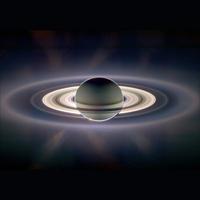Saturn's rings are much older than previously thought

Recent scans on the planet Saturn by the space probe Cassini–Huygens have shown that the planet's rings are much older than previously thought. Recent data says they may be as old as the solar system itself.
The new scans have indicated that the rings are likely three to five billion years old, and will probably be around for billions of years longer. Scientists previously thought the rings to be only about 100 million years old.
"Despite what was thought after the [1970s] Voyager investigations of Saturn - that Saturn's rings might be very youthful, perhaps only as ancient as the dinosaurs - we have results that show the rings could have lasted as long as the Solar System and maybe will be around for billions of years. Recycling allows the rings to be as old as the solar system although continually changing," said researcher Professor Larry Esposito.
The determination was made when Cassini's Ultraviolet Imaging Spectrograph (UVIS) analyzed the light from the Sun reflecting off particles in the rings of all different sizes. The data had shown that there was a lot more clumpy material and as much as three times more mass than what was previously found in the Voyager missions .
Scientists assumed that particles from an exploding comet may have caused the rings to form, but the new data says that it is unlikely to be the case, because the particles are all of different ages.
"Although the Voyager observations indicated Saturn's rings were youthful, Cassini shows even younger ages; and because we see such transient, dynamic phenomena in the rings we are able to reach the paradoxical conclusion - because the rings appear so young, they may actually be as old as the Solar System," added Esposito.
Cassini is operated jointly by NASA and the European Space Agency .
 Back and Next - Back and Next
Back and Next - Back and Next See Also - See Also
See Also - See Also